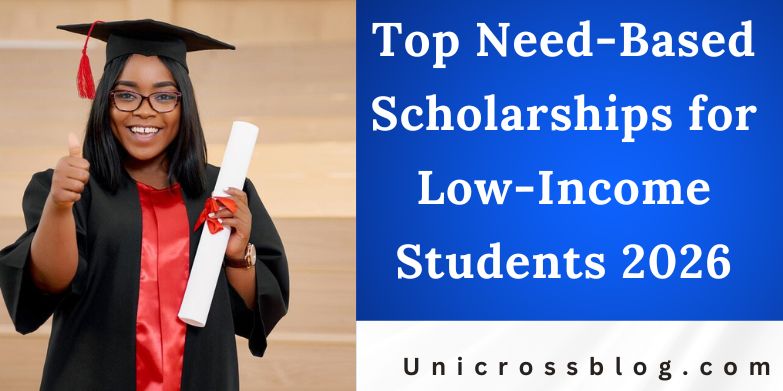Pursuing higher education can transform lives, opening doors to better careers, personal growth, and economic stability. Yet, for low-income students, the rising costs of tuition, books, housing, and other expenses often create insurmountable barriers. In the United States, the average cost of attending a public four-year college is over $10,000 per year for in-state students, and more than $38,000 for private institutions.
For families earning less than $30,000 annually, these figures represent a dream deferred, with many turning to loans that lead to crippling debt. Need-based scholarships emerge as a beacon of hope in this landscape. Unlike merit-based awards that reward academic or extracurricular excellence alone, need-based scholarships prioritize financial hardship, ensuring that talent and ambition are not sidelined by poverty.

Top Need-Based Scholarships for 2026
Here are ten standout need-based scholarships tailored for low-income students. These selections emphasize accessibility, generous funding, and relevance for the 2026 cycle, including options for high school seniors, undergraduates, and specific demographics. Focus on those aligning with your background, and prepare documentation like tax returns or FAFSA results to demonstrate need.
1. Horatio Alger National Scholarship
Inspired by the rags-to-riches tales of author Horatio Alger Jr., this program honors students who overcome adversity through determination. It targets high school juniors from households with incomes under $65,000, emphasizing resilience in the face of economic challenges.
-
Award: Up to $25,000 per year, renewable for up to three additional years.
-
Eligibility: U.S. citizens or legal residents, minimum 2.0 GPA, involvement in extracurriculars or community service.
-
Deadline: Typically late March 2026.
-
Why Apply: Beyond funds, recipients gain access to mentorship, leadership workshops, and networking events, fostering long-term success.
2. The Gates Scholarship
Founded by philanthropists Bill and Melinda Gates, this initiative supports outstanding minority students from low-income families, aiming to build a diverse pipeline of leaders. It is a last-dollar scholarship, covering unmet costs after other aid.
-
Award: Full cost of attendance, including tuition, fees, room, board, books, and transport, up to $100,000+ annually.
-
Eligibility: High school seniors from underrepresented groups (African American, Hispanic, Native American, etc.), 3.3 GPA, leadership potential, and family income below $30,000.
-
Deadline: September 2026.
-
Why Apply: Highly selective but transformative, with alumni in top graduate programs and careers in tech, policy, and nonprofits.
3. Unmet Need Scholarship (Sallie Mae Fund)
Designed to bridge gaps in federal aid, this program aids families where loans fall short. It focuses on students from households earning less than $30,000, prioritizing those with demonstrated persistence.
-
Award: Up to $3,000, non-renewable.
-
Eligibility: U.S. citizens or legal residents enrolled in an accredited college, demonstrated financial need via FAFSA, minimum 2.5 GPA.
-
Deadline: Typically May 2026.
-
Why Apply: Ideal for students needing a final boost to cover costs like textbooks or housing, with a straightforward application process.
4. QuestBridge National College Match
This program connects high-achieving, low-income students with top-tier colleges, offering full-ride scholarships to partner institutions like Stanford, Yale, and MIT. It emphasizes holistic excellence alongside financial need.
-
Award: Full four-year scholarships covering tuition, fees, room, and board, averaging $50,000+ per year.
-
Eligibility: High school seniors, household income typically under $65,000, strong academic record (top 5-10% of class), leadership qualities.
-
Deadline: Late September 2026 for binding match, additional deadlines for non-binding applications.
-
Why Apply: Matches students with elite schools, reducing debt and providing access to world-class education and networks.
5. Jack Kent Cooke Foundation College Scholarship
This foundation supports high-achieving students with significant financial need, offering comprehensive support through college. It’s known for its generous funding and personalized advising.
-
Award: Up to $55,000 per year for four years, covering tuition, living expenses, and books.
-
Eligibility: High school seniors, minimum 3.5 GPA, household income under $95,000, intent to enroll in a four-year college.
-
Deadline: November 2026.
-
Why Apply: Offers renewable funding and academic advising, ideal for driven students aiming for competitive careers.
6. Coca-Cola Scholars Foundation
While partly merit-based, this scholarship prioritizes community service and leadership, with a strong need-based component for low-income applicants. It supports students who give back to their communities.
-
Award: $20,000, one-time award.
-
Eligibility: High school seniors, minimum 3.0 GPA, U.S. citizens or permanent residents, demonstrated financial need.
-
Deadline: October 2026.
-
Why Apply: Funds can be used flexibly, and recipients join a vibrant alumni network with internship and job opportunities.
7. Dell Scholars Program
Backed by the Michael & Susan Dell Foundation, this scholarship supports students who have overcome significant obstacles, including poverty, to pursue higher education.
-
Award: $20,000 over six years, plus a laptop and mentoring.
-
Eligibility: Participation in a college readiness program (e.g., Upward Bound), minimum 2.4 GPA, Pell Grant eligibility.
-
Deadline: December 2026.
-
Why Apply: Holistic support, including technology and coaching, helps first-generation students navigate college challenges.
8. APIA Scholars (Asian and Pacific Islander American)
This program supports low-income Asian and Pacific Islander students, addressing unique financial and cultural barriers to higher education.
-
Award: $2,500 to $20,000, renewable based on need.
-
Eligibility: Asian or Pacific Islander descent, U.S. citizens or legal residents, minimum 2.7 GPA, enrolling in a U.S. college.
-
Deadline: January 2026.
-
Why Apply: Tailored for AAPI communities, with additional resources for career development and cultural engagement.
9. Elks National Foundation Most Valuable Student Scholarship
While competitive, this scholarship includes a need-based evaluation, supporting students who show financial hardship and community involvement.
-
Award: $4,000 to $50,000 over four years.
-
Eligibility: High school seniors, U.S. citizens, demonstrated financial need, leadership, and academic promise.
-
Deadline: November 2026.
-
Why Apply: Flexible use of funds and a long-standing reputation make it a reliable choice for low-income students.
10. Federal Pell Grant
A cornerstone of federal aid, the Pell Grant is automatically considered when you submit the FAFSA. It’s a lifeline for millions of low-income students.
-
Award: Up to $7,395 for the 2026-27 academic year, based on need.
-
Eligibility: Undergraduate students, U.S. citizens or eligible non-citizens, significant financial need per FAFSA.
-
Deadline: June 30, 2027, for the 2026-27 award year, but apply early for state and institutional aid.
-
Why Apply: Non-repayable and widely accepted, it’s the foundation for building a scholarship package.
READ ALSO: Law Scholarships for African Students Abroad 2026
FAQs
What qualifies as “low-income” for these scholarships?
Low-income typically means a household income below $65,000, though thresholds vary (e.g., $30,000 for Gates, $95,000 for Jack Kent Cooke). Most programs use FAFSA’s Expected Family Contribution (EFC) to assess need. Check each scholarship’s guidelines.
Do I need perfect grades to apply?
No, many scholarships prioritize financial need over academic perfection. GPAs range from 2.0 (Horatio Alger) to 3.5 (Jack Kent Cooke). Leadership, resilience, and community involvement often weigh heavily.
How do I prove financial need?
Submit the FAFSA to generate an EFC, which most scholarships require. Additional documents like tax returns, W-2s, or a statement of hardship may be needed. Keep records organized and apply early.
Can I apply for multiple scholarships?
Yes, stacking scholarships is encouraged to cover costs. Ensure you meet each program’s eligibility and track deadlines, as some (e.g., QuestBridge Match) are binding.
Are these scholarships renewable?
Many are renewable (e.g., Gates, Horatio Alger) if you maintain academic progress and financial need. Non-renewable awards (e.g., Coca-Cola) can still be paired with others for ongoing support.
What if I’m not a high school senior?
Some scholarships, like the Pell Grant and APIA Scholars, are open to current undergraduates. Others, like Dell Scholars, support students beyond the first year if eligibility persists.
How can I stand out in applications?
Craft compelling essays that highlight your resilience, goals, and community impact. Secure strong recommendation letters and verify all financial documents for accuracy.







